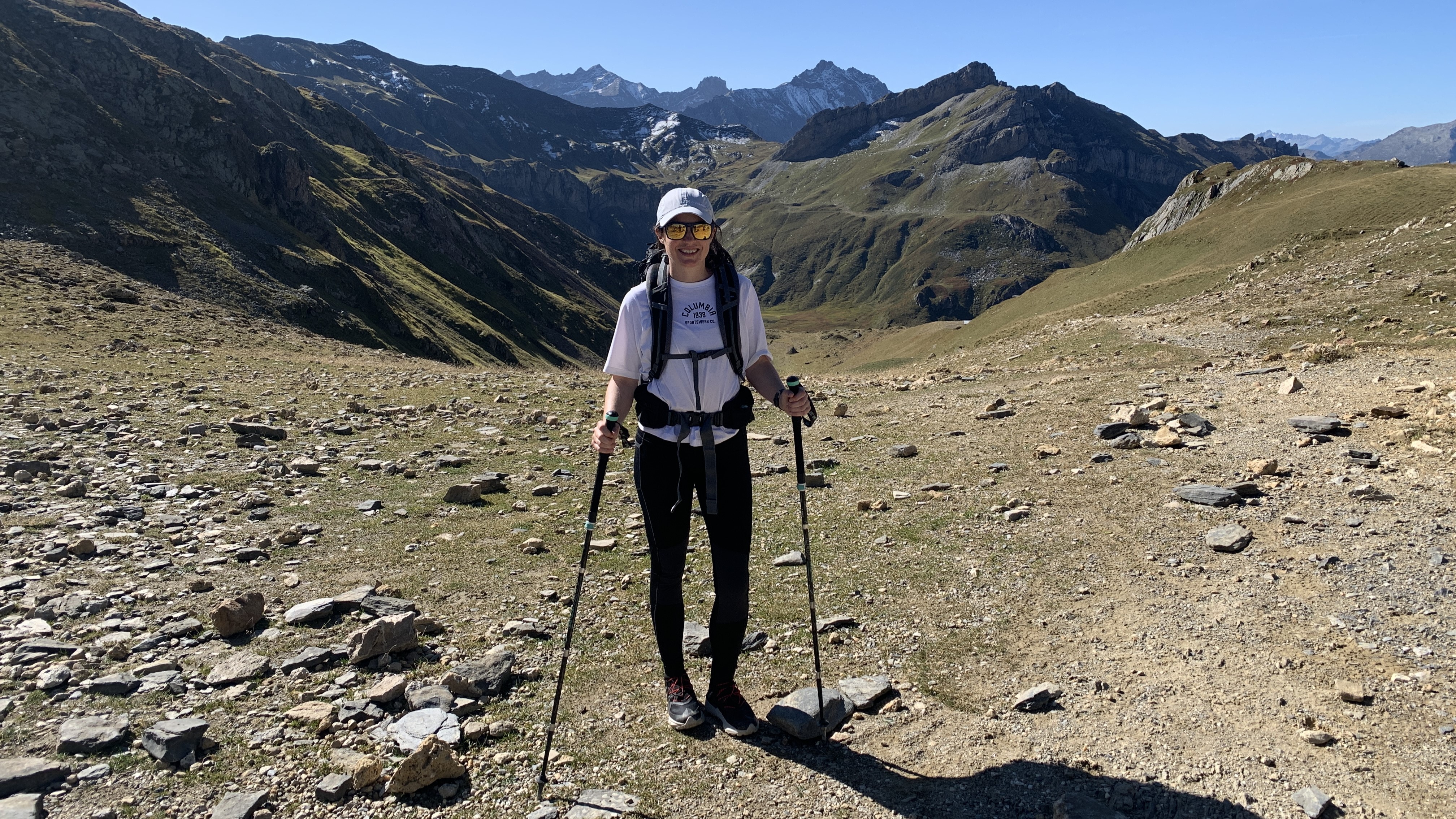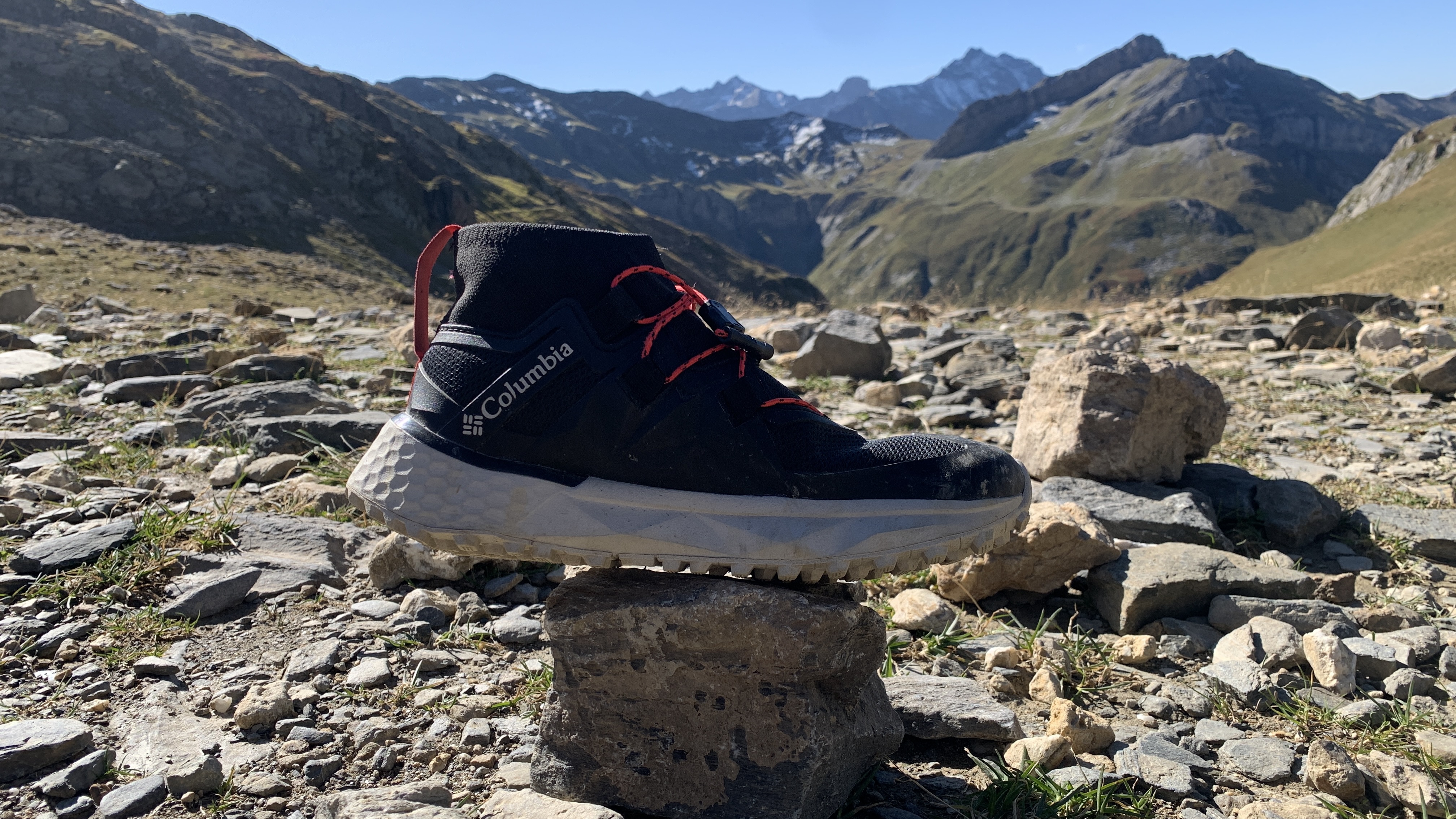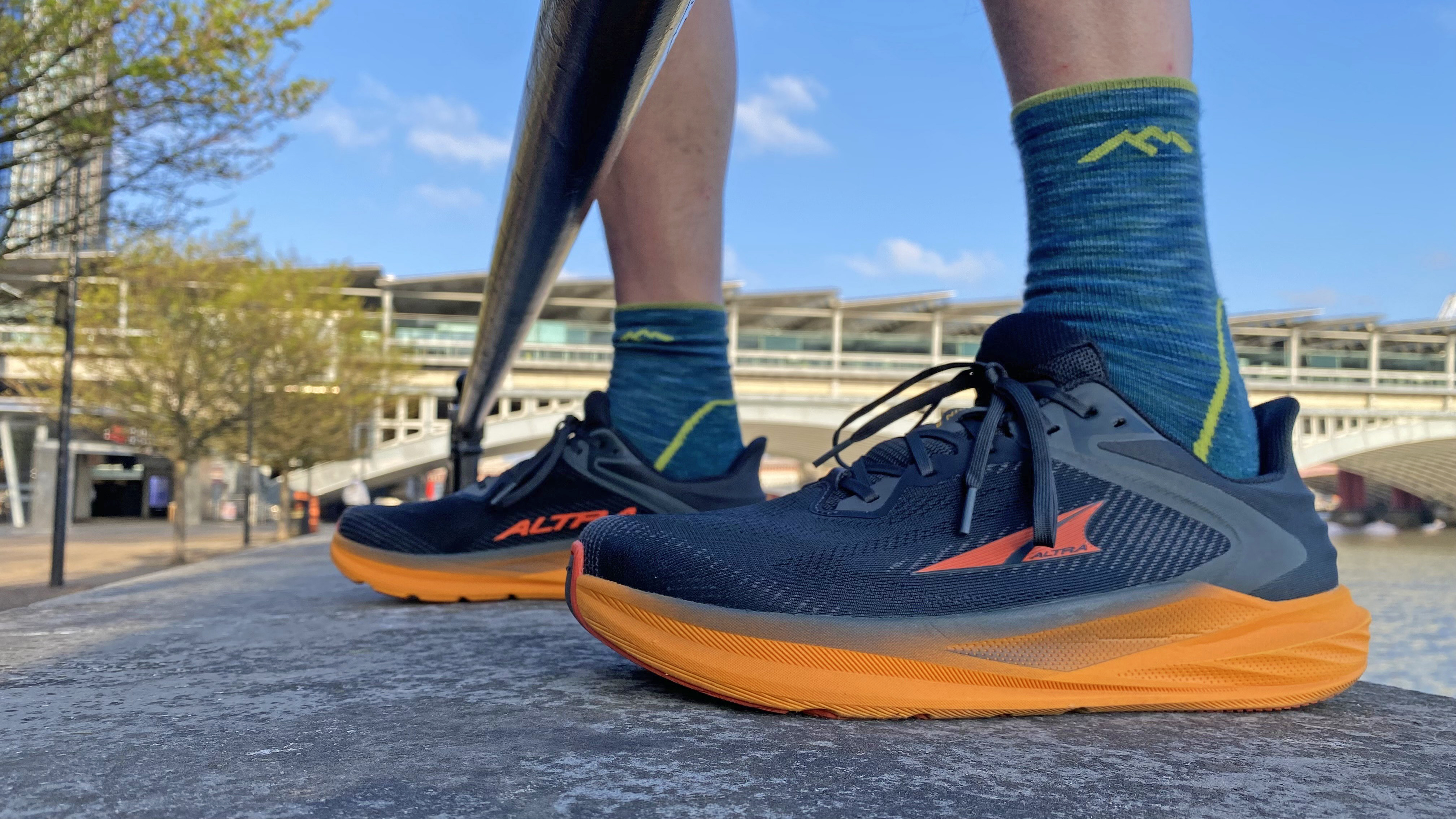Advnture Verdict
Looks can be deceiving and we were pleasantly surprised by the performance of these deviantly designed shoes, which run warm but keep you nimble on rough tracks
Pros
- +
Fully waterproof
- +
Out-of-the-box comfort
- +
Good lockdown with secure bungee cord lacing system
- +
Good grip on steep and rocky trails
- +
Good protection against roots and rocks
Cons
- -
Not very breathable
- -
Toe box may be too narrow without sizing up
- -
Not as light as they look
You can trust Advnture
Columbia Facet 75 Alpha Outdry Lightweight Waterproof Hiking Shoes : first impressions
These rather futuristic-looking hiking shoes probably won’t inspire much confidence among seasoned hikers at fist glance, but we found them to be surprisingly technical in the steep terrain of the French Alps. The sneaker-like construction rewards the curious hiker with out-of-the-box comfort, but despite being called shoes, they come up to mid ankle. Mesh panels in the uppers are reinforced to protect toes and heel against sharp and hard trail hazards, though no such protection exists for your ankle bones, and the whole package is shored up with a bungee cord lacing system which ensures a supportive fit around the ankle with room for your feet to swell.
• List price: $160 / £155
• Gender specification: Men’s and women’s sizing available
• Sizes: Men’s: 7 - 15 US, 6 - 14 UK / Women’s: 5 - 12 US, 3 - 10 UK
• Weight (per shoe): 320g / 11.2 oz (women’s US 6.5)
• Materials: Mesh/knit upper, Techlite PLUSH midsole, Adapt Trax outsole
• Colors: Deep madeira / Beetroot, Black / Red coral, Cypress / Black, Cloud gray / Black
• Best use: Hiking
When we tested these on steep, dry and rocky trails, we found the grip held up well and while the midsole is reasonably robust, it flexes well at the toe so we could still get a little trail feel. They’re easy to pull on and off like a sneaker, though not quite as light as they appear. The main downside of these shoes is the lack of breathability, and we found we had sweaty feet in them whether we were hiking in warm weather, cold weather or even just sitting on a plane. That’s often the price to pay with waterproof shoes, and these particular ones tow an interesting line between being modern and casual while offering some pretty decent protection in rugged conditions. If you’re looking for something a little technical that doesn’t look like a traditional hiking boot, you might well consider these but they’re definitely best suited to colder weather.
Columbia Facet 75 Alpha Outdry Lightweight Waterproof Hiking Shoes: in the field

Aesthetically speaking, these are certainly not the hiking shoes I’d make a beeline for in the store and pick out for my next hiking trip. They’re just a little strange-looking if I’m being honest. That said, when I went on a press trip this fall with Columbia to test their new line of gear during a hut hiking trip in the French Alps, I was given the choice between these and a more traditional-looking pair of hiking shoes, and always one to lean in to the unusual, I went with these.
Though it was just a short trip, I managed to get about 30 km in them over three days which gave me a pretty good feel for how they handle a hiking trail.
Here’s how they performed:
Size and fit
I am a UK size 3.5 but generally size up to a 4 to give my feet room to swell. While I was wearing these shoes in the Alps, I’d have said they run just a little large, but when I returned home, I realized I had been wearing a 4.5. There’s a decent amount of room at the end of my toes and in retrospect, I’m glad I went up a full size because just by looking at them, I’d say the toe box may be too narrow for some feet.
Other than that, the socklike construction plus lacing system means they’re comfortable snug around my midfoot and ankle to ensure stability without being tight.

Comfort and breathability
This was definitely a gamble, but I checked that these fit then I went to France without breaking them in, and I managed to hike 30 km in three days in them without any rubbing or blisters.
What reduces their comfort is the lack of breathability. Because I wanted to travel with a carry-on, I wore them on the plane and instantly noticed my feet getting hot and sweaty. While we were hiking during the day, it was unseasonably warm so I wasn’t totally surprised to have hot feet on a hard hike, but even when I was just sitting in an air conditioned airport, I found them warm which I’d say is the main downfall of these shoes.
Grip and performance
I was hiking on part of the rugged UTMB trail, so the terrain was generally really steep (not big on switchbacks over there) and rocky, and one night we were out well after dark coming down very loose trail in the moonlight so there was lots of opportunity for me to slip and I didn’t, once. Though I haven’t been able to test them in the mud, I did do some good stream crossings and had no problem with traction.
In terms of performance, they offer a pretty good ride, with a nice balance between protection and flexibility in the midsole, so I can walk long distances in them without my feet hurting and still get a little trail feel. Though sizing up made them feel quite spacious, the midfoot and ankle lockdown meant my foot didn’t move around much in them, so no bashed toes after a long descent.
Protection and stability
Though these shoes certainly fall into the category of ‘sneaker-style’ hiking shoes, they have good reinforcement around my feet so they work for rocky trails, though it’s just a stretchy mesh surrounding the ankle. The waterproof membrane works a treat, and the socklike construction means there’s nowhere for damp to seep in.
Columbia hasn’t gone too plush or too rocker with the soles, so overall I get a pretty stable ride.
Columbia Facet 75 Alpha Outdry Lightweight Waterproof Hiking Shoes: the bottom line
Rugged enough to handle rocky and steep terrain, these shoes are more technical than their appearance lets on, and may be appealing to the next generation of hiker, but the lack of breathability might mean you’d best save them for cold hikes.
Julia Clarke is a staff writer for Advnture.com and the author of the book Restorative Yoga for Beginners. She loves to explore mountains on foot, bike, skis and belay and then recover on the the yoga mat. Julia graduated with a degree in journalism in 2004 and spent eight years working as a radio presenter in Kansas City, Vermont, Boston and New York City before discovering the joys of the Rocky Mountains. She then detoured west to Colorado and enjoyed 11 years teaching yoga in Vail before returning to her hometown of Glasgow, Scotland in 2020 to focus on family and writing.


